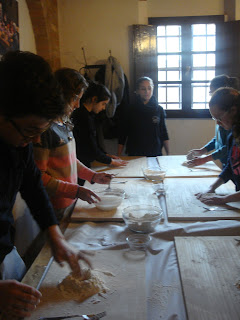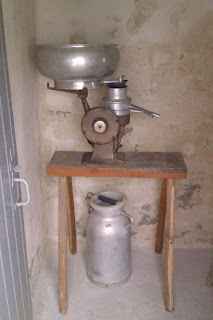Last
week, I and a bunch of friends, along with some teachers went to Italy. When we
arrived, our hosts greeted us very warmly. They were all really nice, and we
had a really great time together. I hope, that they will visit us in Bulgaria
someday.
We also went to a lot of interesting places in Italy. We visited the “Leaning Tower”, which was really majestic, and
San Gimignano, which was, I have to admit, one of the most beautiful places
I’ve seen in my life. We also visited a farm, and they taught us how to make
bread.
Well,
I have to say, that it was a really awesome trip, and I would definitely do it
again, if I have the opportunity.
Levent
,18 , Bulgaria
Last month I, my friends and my teachers went to Pisa, Italy. The travelling was very interesting. It was my first time to see the legendary
Leaning Tower of Pisa! And also it was my first time to fly with a plane and my
first time to travel to country that doesn’t border with Bulgaria. In Pisa as I
said we saw The Leaning Tower and other interesting ancient buildings. The
family I stayed at was very nice. And also we went to something
like a bakery and a wine house together which was in the countryside.
There we learnt how to make a special bread which is made only in this region.
Then we went to San Gemignano. This town has interesting history which we heard from the amazing tour guide we
had. Unfortunately, we couldn’t go
to Florence because our flight from Paris was canceled. But what we could see
was also very cool! Thank
you Elisabetta and all Italian friends for making all this true !
Jivko, 15, Bulgaria
Our
trip started on 12 March last month and it was the most exciting and
adventurous travelling I have ever been! First I have to share with you that
our group was very cool - 4 teachers and 7students. Our main goal was to visit Italy and meet
with the Italian students and their culture. It was so funny! I’ll tell you a
little more…
So we went to Sofia
- the capital of Bulgaria
first and we arrived in Paris,
France soon. But
who may predict... it was snowing there! Yes, it was white and windy- beautiful
view but it caused some little problems. Our flight to Pisa was canceled.
We
sang, we were talking jokes each other and we became a real team. On the next
morning we were a bit tired but we were happy that we were going to Pisa. When we finally arrived
in the beautiful Italian city we were surprised that our luggage wasn’t there.
But
that’s not important! We kept calm and we were so pleased when our hosts came.
Everybody met for the first time the person that he/she expected.
My
hosts were a big family and they were so kind with me. When I walked into the
house there was a poster over the door which was named- Welcome Yoana! J We had dinner – a very delicious pizza which they had
prepared for me. We talked about so many things, the Italian language, the
Bulgarian language, our hobbies, talents and our favourite things. I and my
host family found very common interests.
On
the first day in Pisa
we visited the school and we participated in an interesting game - everybody had
to present his language in 3 sentences and the others repeat it. We enjoyed
this game very much.
Then
we looked the exhibition of the five countries in the school hall.
The
thing that I’ll never forget is the Leaning tower of Pisa.
It is one of the most famous tourist attractions in the world. And we were
enchanted of it.
In
the afternoon we visited Marina di Pisa and took some photos.
Next
day was planned like a trip to San Gimignano town - a very ancient place with
beautiful nature views and a long history. And that was our last night
together, we had just met ourselves and we already had to say goodbye. I was
sad that I couldn’t give to my host family my presents for them, but we promised
that we will meet again. I hope someday they will come to my town in Bulgaria.
Bridges
have been built between us. Our smiles showed that we met new friends and we
found out many things about Italy
and the other countries involved in the project.
Now
we are waiting for the next work meeting which is going to be in Nikopol. We hope you will
be pleased and happy as we were. J
Yoana Karadzhova
26.03.2013
16years, Nikopol





























































